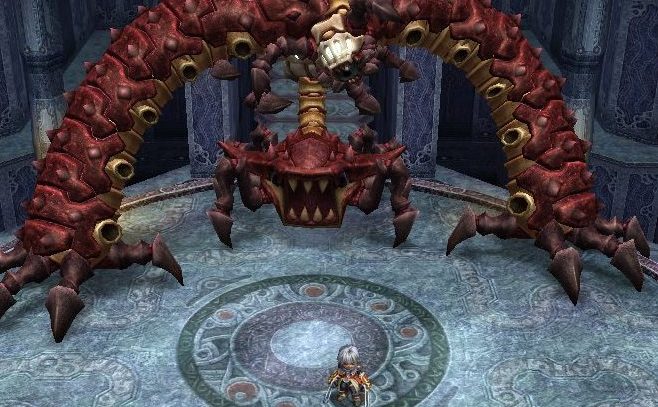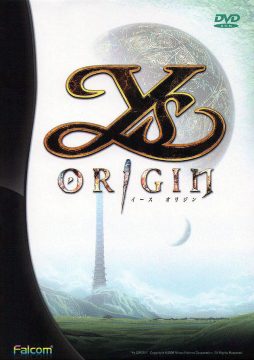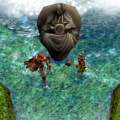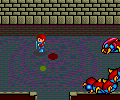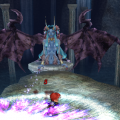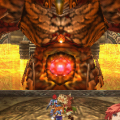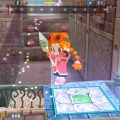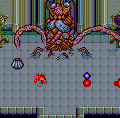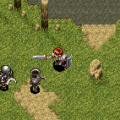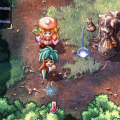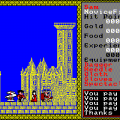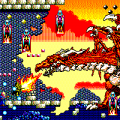- Ys Book I & II
- Ys III: Wanderers from Ys
- Ys IV: Dawn of Ys / Mask of the Sun
- Ys V: Ushinawareta Suna no Miyako Kefin
- Ys VI: The Ark of Napishtim
- Ys: The Oath in Felghana
- Ys Origin
- Ys Seven
- Ys: Memories of Celceta
- Ys VIII: Lacrimosa of Dana
- Lacrimosa of Dana (Novel)
- Ys IX: Monstrum Nox
- Ys X: Nordics
- Ys Strategy
- Ys: The Call of Solum
- Ys vs. Sora no Kiseki: Alternative Saga
- Ys (Anime)
Ys Origin is the first game in the series that doesn’t star, or even involve, Adol Christin (although he is technically a hidden character). In fact, it takes place seven hundred years prior to the first Ys game – not long after the kingdom of Ys was launched into the sky in order to save itself from demon attack – and elaborates on the backstory presented in the initial entries of the series.
The two goddesses of Ys, Feena and Reah, have mysteriously disappeared from their home in Solomon Shrine. A search party, consisting of members of the Holy Knights of Ys, is sent to the ground to discover what has become of them. What they find is a broken, desolate land, barely fit for human life. Their search leads them to a gigantic spire (which will eventually be known as Darm Tower), where invading forces want to use the power of the goddesses for their own nefarious ends.
Ys Origin runs off the same engine as Ys VI and The Oath in Felghana, so it looks and plays almost identically. There are a total of three different playable characters, each with different skills, although only two are available at the beginning.
Characters
Yunica Tovah
The granddaughter of one of the six priests of Ys, she is part of a search party to discover what happened to the goddesses. She cannot use magic, which makes her an outlier amongst her family, so she’s constantly fighting to prove herself. Being focused on physical strength – a unique twist for a female character – she plays pretty much like Adol from The Oath in Felghana, right down to similar magic spells. Her main weapon is a small axe, although she gets a large sword later on.
Hugo Fact
The ancestor of the evil Dark Fact, Hugo is a powerful magician with projectile basedspells. He controls two floating orbs that effectivelytriple his firepower. He also has a variety of shieldsat his control. Playing as Hugo almost turns the game into a run-n-gun shooting game, although unfortunately he can’t strafe, so aiming is awkward.
The Claw
Secretly one of the members of the Fact family, The Claw has… well, two very large claws. He seems to be evil – you’ll fight him a few times during the course of the regular game – but becomes playable after clearing everything with Yunica and Hugo. He plays much like Yunica, although with different special abilities, including a cool speed dash and a flaming uppercut punch. While Yunica and Hugo’s story intertwine with each other, The Claw’s stands alone, and is considered the canon plot.
Zaba, Kishgal and Epona
Three members of the group that has invaded the tower. Zaba appears to be the leader and is a powerful sorceress. Kishgal wield a pole-axe and has incredible strength, while Epona is agile and attacks with a trident. They are probably meant to resemble the clan of darkness trio from Ys IV, particularly Zaba.
For those that remember Ys II, many of the character names should sound familiar, as they’re related to the Six Priests of Ys, whose books Adol needed to return near the beginning of the game. In fact, most of the story amounts to fan service for fans of the original games. Beyond the characters and the goddesses, both of the main characters’ quests begin with them talking with a Roda Tree. One of the first items you find is the Mask of Eyes, which serves the same purpose of allowing you to see hidden passages. The story ultimately focuses on the Black Pearl, the mystical object responsible for all of the demons in the first two games. There are references to other installments too, including a character named Kishgal, who shares the name of an ancient city found in Ys VI.
The whole game takes place inside of Darm Tower, which feels constrained compared to the open worlds of the previous games. It’s not entirely linear though, since you’ll occasionally need to do some backtracking. The level themes are retreads of the usual RPG cliches. The first area is a fairly nondescript dungeon. The second area is a water shrine, though it’s one of the few times that a water area is actually fun, since the characters move without resistance and the “swimming” just basically means there’s no gravity, and the oxygen supply is generous. The third area is a fire shrine, complete with lava and rotating blades, and the fourth area is full of sand. There’s not much variation in the textures beyond differentiation in the color palette, and outside of a few cool areas later on, it has a tendency to feel a little repetitive.
The quality of the soundtrack is mixed too. The main theme, played during the intro anime and near the end, is the sort of high quality guitar anthem that you’d expect from an Ys game. But otherwise, pretty much anything that isn’t a boss theme is generally good, but not great. Keeping with the nostalgia theme, there are a handful of remixed songs from the first two games, but they range from boring, like the half-hearted arrangement of “Tower of Shadow and Light”, the original Darm Tower theme, to obnoxious, like “Tension”.
The main game is relatively short, which is comparative to some of the earlier Ys titles, with a single playthrough generally taking between six and eight hours. Yunica and Hugo plow through identical levels, but their story scenes are different. Once you beat the game, you unlock the third character, The Claw, who also has a unique story mode. He easily has the best plotline, since he’s technically working with the enemies, and it gives a whole new perspective on the events seen by the other characters. It is a little annoying that you need to play through the game multiple times with different characters to fully understand the story. However, since most of the Ys games follow similar beats, it is welcome to see Falcom do something more original with their plots. It’s also a little unusual to play an Ys game without a silent protagonist, but their personalities add some extra drama and sense of player involvement.
Since there aren’t any towns or shops, most of the character interaction is done by hanging out at the base on the ground level of the tower. There are a handful of Roos hanging out at various points in the tower, which will give you assorted items if you can find a Roda Fruit. Some of these items include Cleria Ore, which can be used to fortify your equipment. Additionally, there are Goddess statues spread throughout the tower. These act as both save and teleportation points, but you can also use SP, obtained for destroyed enemies, to obtain a variety of perks.
Still, even if the level design is a little dry, Ys Origin does not disappoint when it comes to boss fights, which still look amazing. Many of them are homages to bosses from the original Ys, although some have been drastically reworked. The first boss of the original game, Jenocres, appears here, though the flame spewing statues now shoot lightning too. One of the bosses in the shrine of Ys I was a centipede named Nygtilger – here, it crawls around a gigantic column, and then connects itself head to tail in the form of circle, rolling around the area. And Zava commands the two demon heads Yogleks and Omulgun as her familiars.
Overall, Ys Origin is still a pretty solid game. The action is just as exciting as it ever was, the story is one of the best of any Ys game, and the different playing styles of the three characters are both a lot of fun and keep the game from feeling too much like its predecessor. But the required multiple playthroughs and drab level designs feel like the game was made with a small budget, marking the title as a holdover until Falcom was able to produce Ys Seven.
Shortly after the Japanese release, Falcom released a patch that adds several new things to the game, including Napishtim and Felghana versions of Adol for use in the Time Attack mode, extra difficulty settings, alternate versions of the other characters with slightly different moves, a hidden boss, and a new outfit for Yunica. While this is included in later shipments, the patch is so big that it needed to be applied by ordering a CD straight from Falcom.
While Ys Origin was originally released in Japan in 2006, XSeed published an English localized version in 2012 on Steam. In addition to featuring the patched version, it also adds achievements and widescreen display. Additionally, you only need to beat the game once to unlock The Claw’s storyline. In the Japanese release, you needed to beat the game with both Yunica and Hugo, which was quite tedious.
In 2017, DotEmu brought Ys Origin to the PlayStation 4 and Vita. They’re pretty straight ports, with only a few minor interface enhancements, like larger indicators to show your XP or status gauges, and the ability to fast-forward through cutscenes. The PS4 version runs at 60 FPS; the Vita version tops of 30 FPS but occasionally slows down during some of the boss fights and other hectic moments. Otherwise, it’s comparable to the PSP version of Felghana, though a bit nicer looking due to the higher resolution screen. Both versions are also missing the blood splatter when killing enemies too. It uses XSeed’s English translation, though like the Japanese PC version, you need to beat the game with both characters to unlock The Claw.
The Japanese mobile phone version this time wasn’t done by Arc System Works anymore, but a little known studio called ScriptArts.
